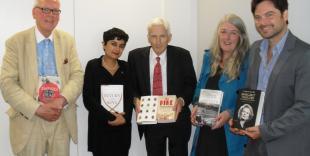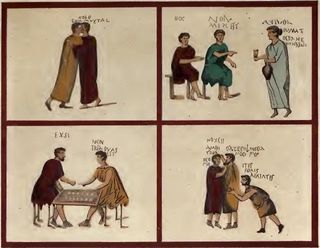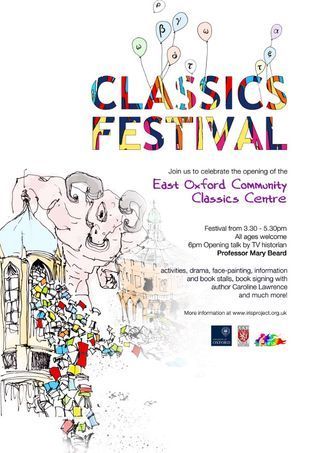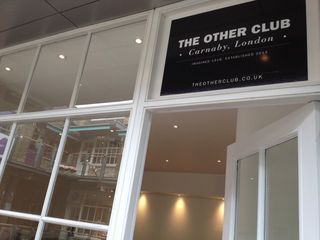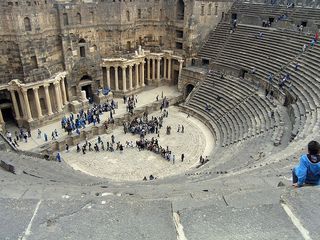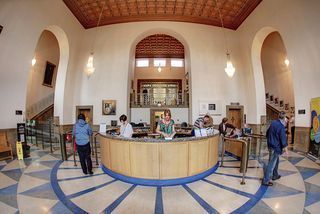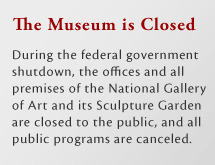Mary Beard's Blog, page 40
November 2, 2013
Try being a Stoic for a week?
Today was Heffers Classics Festival, which had this year moved to rather grander and more capacious premises in the Law Faculty. I was in a great trio performing at 10.00 to about 250 people (thanks all for turnng up). Jo Paul talked about the "uncanniness" of the modern image of Pompeii (somewhere between a living city and a city of corpses), Jules Evans talked about the roots of Cognitive Behavioural Therapy in ancient philosophy (I liked his euphemism of "amateur neuroscience" for experimenting with recreational pharmaceuticals). And I did a turn on Roman jokes.
After a really helpful discussion with my colleague Franco Basso about some of the more opaque jokes in the Philogelos, I decided to try out one that we had discussed (to see if I got a laugh):
“A scholastikos (?'egg-head') had bought a house and leant out of the window and
asked people going by 'do I look good in this?' "
Franco thought that the idea of treating the house as if it was a new dress was quite amusing; I was less convinced. But anyway I can confirm a laugh was indeed raised. (Must have been the way I told it, I thought!)
Jules also gave a well-deserved puff for the second annual "Live Like a Stoic Week" -- in which we can all do exactly that. Highlights range from Stoic discussion sessions in your local pub, to a handbook of Stoic exercises on which you can train your mind. There's even more info here.
I must admit that Stoicism isn't exactly my cup of tea. Of the ancient world's philosophical systems, it has always struck me as one of the nastiest (but don't trust me, I'm not an expert). On the other hand, "being a Stoic for a week" seems a pretty good way of spreading the word about ancient philosophy -- so long as we are allowed to give it up when the week has passed.
But -- stoically or not -- my mind is really on the Samuel Johnson prize, whose winner is announced on Monday night at what I guess will be a good dinner. OK, I know it must be more nerve-wracking for the shortlisted authors, but I can tell you that this judge at least hasn't escaped the agony... a brilliant field, and a whole set of tough decisions, and dark nights weighing up the merits.
It reminds me a bit of marking students' finals papers. You tell them how stressful it is doing the marking, and making life-changing decisions about people's work. And the way they look back at you says very clearly that it isn't half as stressful as actually taking the exams.
October 30, 2013
Popular Latin?
We are now almost halfway through our final year Classics course on "Roman Popular Culture" (or "Cultures" as we have come to call it -- plural is a better representation of what we are actually taking about).
Doing a new final year course is always difficult, fun and a bit vertiginous. By which I mean you know in broad terms where you're going, but you never quite know exactly which turn you are going to take, or which particular text is going to be the most interesting ... or (same thing really) the most worth discussing.
You also learn lot (partly thanks to the students).
One question we want the students to reflect on is whether Roman plebs (Andrew Mitchell style) spoke different Latin from the toffs (the subject of Jim Adams latest block-buster that we are all reading).
The estimable James Clackson on Monday gave us in his lecture on the course a smart overview of popular Latin, and used as his logo the pictures from the bar of Salvius, above (and he directed us, inter alia, to the work of Peter Kruschwitz on the Latinity of popular inscriptions in Pompeii).
In fact, he referred to our earier discussions on this blog and wanted to make clear that the text was not such "bad Latin" as we had assumed. I can't summarise the whole argument, but I have to say that he was very clear that the phrase "duas est" was not so bad as we might have thought.
It's true that "duas est" in Latin LOOKS very bad Latin indeed (feminine plural accusative with singular verb 'to be' .. err hang on?), but try seeing "duas" as a Latin version of the Greek "dyas" (a pair, a double) -- and then the grammar is just fine.
But that's how the course has gone throughout. We're trying to work out what we might mean by "popular culture"..how far is the "popular culture" a shared culture (with elite culture marked off as different and "closed", even if the elite shared the popular -- if you see what I mean)? How far is there a stand-off between elite and non-elite? And how far can we recognise what that stand-off might mean?
Anyway .. that's what we are discussing Monday, Tuesday and Thursday all this term. (Hope students are enjoying as much as we are).
October 25, 2013
Good news for Classics
There's an awful lot of gloom about "education" -- from almost every direction. But Latin and 'classics' is quite a good news story at the moment. A few weeks ago there was a great article in the Times by Sarfraz Mansoor (mostly reprinted here) about Classics for kids in Walthamstow.
Then just yesterday, I beetled across to Oxford, to do a Q and A gig at Blackwells home base (and yes, thank you all, I found that book I was looking for about Petitions in Roman Egypt in the OUP bookshop!) This was great fun: a discussion with my mate Armand D'Angour, really about how we do Classics, and why -- and a great audience.
Then we (Armand and moi) went on to Cheney School, where there was a great celebration to open the East Oxford Community Classic Centre which it is hosting, and masterminded by the Iris Project. Kids from all over the area will be able to go there to learn Latin and Greek and many other kinds of classically related things -- for free (there were some from Worcester at the opening events!). Even less reason now to say, here in Oxfordhire at least, that it is only in the posh schools you can learn classics.
There had been a really big celebration by the time we arrived, including Caroline Lawrence, author of the Roman Mysteries, who is always a huge draw to anyone under about 13, and a great may over. We had the final half hour, and about 250 people (from 2 to about 82).
Armand kicked off, with a hugely impressive bit of video showing exactly how a Sardinian windpipe player plays what looks like the modern equivalent of the ancient aulos. (You have to do, Armand says, "double breathing" .. so you keep the puff in your cheeks as you breath out through your mouth and in through your nose, and you look a bit puffed up. Armand has an ancient music project, so I think he knows...)
Then I came on to do the next bit and the "opening" itself. Terribly exciting, but for a speaker a nightmare-ishly diverse audience. Luckily I was handed a story on a plate, because it was the very day on which the new Astérix (and the Picts) was published. And there is a lot of meat in Astérix -- not just some silly puns on Romans names (in the English version "Marcus Ginantonicus" is my favourite, I confess).
So my talk was mostly about what Astérix shows us about why we still feel that the Romans are in our cultural DNA. And it wasn't just about the funny side(though there was a glimpse of Frankie Howerd as Lurcio, above).. I ended up thinking about how Roman debates about terrorism, national security and so forth fuel our own
So huge congratutaions to everyone in Oxford involved in this. And lets hope that the whole thing goes -- sustainably (as we now say) -- from strength to strength.The trouble with some of the most exciting classical initiatives is that they crumble, once the charismatic leader has gone.
This one ought to run and run.
October 23, 2013
The Muses return to Cambridge
I had a great evening. I went to give a little speech at the opening of the Great Hall at Coleridge Community College at Cambridge. Fifteen years ago there were plans to close this school; it's now well and truly on the mend -- and there's a truly great atmosphere. It's now part of a school "federation" headed by the Principal Andrew Hutchinson, whom -- as I couldn't resist telling the mixed audience of students, parents and friends of the school -- I had first met more than 30 years ago. He was a post-grad in Classics at Kings College London, where I had just arrived to take up my first "proper job". (He was then referred to popularly as "Hutch", as I strongly suspect he still is.)
My first task was to announce the name of the new hall (so far known, as I've said, as the Great Hall -- one rather empty pic on the right; it was full this evening). There had been a competition and the winner I was able to declare was Radegund Hall. The college is in Radegund Road; there's a St Radegund pub in Cambridge, and she -- for Radegund is a she -- is also patron saint of Jesus College.
rather empty pic on the right; it was full this evening). There had been a competition and the winner I was able to declare was Radegund Hall. The college is in Radegund Road; there's a St Radegund pub in Cambridge, and she -- for Radegund is a she -- is also patron saint of Jesus College.
The truth is that I have until recently been rather more familiar with the road and the pub; but this sixth century lady turns out to a feisty role model for women's education. After escaping a decidely unpleasant husband, she went to off to found a nunnery, where the nuns were actually made to read and write (rather than just clean and sew) -- and she herself put great store by her intellectual accomplishments.
But as well as declaring the Radegund Hall "open", I wanted to enthuse about the excellent piece of glass (at the top of this post) depicting the nine muses, with the names that you can just see; it's by Martin Donlin. They're all there .. Clio, Erato, Urania and the rest. What on earth, I wanted to say (particularly to the students), is the point of the Muses now?
In a sense they had already demonstrated the answer by their music and dance performance at the start of proceedings. But, as I thought about what I was going to say, it struck me how rebarbative the usual explanations of the Muses must sound. "Melpomene: Muse of Tragedy".. what does that say to most teenagers?
So I tried to rethink a bit. Clio is surely not just "Muse of History" (yawn), but Muse of how we think about the past; that is of memory, recollection, remembrance as well as "History". Polyhymnia is not the "Muse of Hymns" , but Muse of how we think we might approariately address and conceptualize god. And so on.
And isn't the point about there being nine something to do with choice, and with different ways to excel and enjoy. Isn't the sheer number of the Muses a way of saying that you aren't -- or cant be -- good at everything. Even the most successful aren't good at everything the Muses represent? Some of us can be real followers of Terpsichore, while never "getting" Urania.
Or am I misunderstanding what the Greeks were meaning?
October 20, 2013
Do computers belong in museum galleries?
I got rather grumpy last week -- to discover a couple of newspaper headlines (and a string of outraged tweets) claiming that I would "ban all computers from 'patronising' museum galleries". To be fair, what followed in the article underneath (in the Telegraph at least) was not so inaccurate, but it gave the impression I had got on my soapbox and "pronounced" on the current state of museums.
In fact "this story" was actually based on an exchange in the question and answer session after I talk about why Classics is important at the Cheltenham Literary Festival. One person asked me what had got me into Classics in the first place and I told my story of going to the British Museum when I was five, and being gob-smacked by the Elgin Marbles -- and also blown away by the fact that when I couldn't see (as I was too little) a piece of ancient Egyptian carbonised cake in a rather old-fashioned case, someone (presumably a passing curator) stopped and opened the case and got the cake out for me.
(I'd love to know who it was, because it transmitted a powerful message: not only that the ancient world was interesting and that even bits of cake could survive for millennia -- but that people would go out of their way to help you discover it. Various friends have made suggestions as to his identity...but any firm info would be much appreciated, even though I guess whoever it was is long dead.)
Anyway a later question atthe Cheltenham lecture returned to museums to ask me what I thought about the way museums related to kids now. I remember that I enthused about the idea of sleepovers with the mummies and about cases at more convenient heights etc. But I did say that I thought some interactive displays were patronising and detracted and distracted from the object (awful memories of my own visits to the Natural History Museum with two kids who were keener on "pressing the buttons" than on actually looking at the stuff). I ended up with a jokey "I think I would just ban computers from museum galleries".
God knows how these exchanges got into the papers. But no sooner had they, than I was bombarded on the one side by people who praised me for speaking out against the tyranny of the machine -- and on the other lambasted as a luddite by a range of museum professionals who were no doubt doing their very best to use up to the minute technology for sharing information.
Blimey. All I'd done, I thought, was have a few exchanges at the end of a lecture. No wonder politicians are dead scared about ever venturing off script or off topic.
So what, on longer reflection, do I think about museums and "computers"?
I do think it's a problem, but a rather bigger and more complicated one than I had a chance to say in the two minutes that I talked about this at Cheltenham.
It basically comes down to the threat of the technology competing with the objects themselves for the visitors' attention (or rather the computers becomingthe display -- Ok in a science museum perhaps). I vividly remember going to a small Pompeii exhibition in London some years back, near the start of museum interactive technology, and gloomily reflecting that there were queues of people by the computer stations, while the Pompeian material itself was taking a definite second place. It wasn't all that different from the button pushing enthisiasm of my own kids at the Natural History Museum, as they moved from machine to machine as if they were in a fairground arcade.
Now, computers aren't the only bits of museum technology that can have this effect (we've all seen the people who wander round the galleries giving more attention to the labels than the objects). And it may be (though I am not so sure) that people are now so used to interactive electronic devices that they aren't quite such a honeypot when put next to some ancient vessel that doesn't give such instant sensory gratification. But all the same, I still think that computers in museums work best when they are physically separated from what's really on display, available as a resource but not in the same room (that's what I meant by banning from "galleries").
My ideal is the Bayeux Tapestry display in Bayeux (or at least my memory of a visit some years ago -- I dread to think it might have changed). There you went first into a gallery with a repro of the tapestry and all kinds of information in all sorts of forms. You could stay there as long as you liked, getting the hang of it before going through to see the Tapestry itself -- just displayed "in the nude" as it were, no labels, no nothing.That seemed to me to be a nice way (though I agree it took a lot of space) of combining uncluttered eyeball-to-eyeball experience of the object with all the background information you could need. Because, for what it's worth, I'm equally resistant to the idea of "letting the objects speak for themselves" -- which usually means "letting the objects speak to those who know about them already".
In a way, of course, I'm being very old fashioned in talking about "computers" or "interactive displays" in museums, as if they were large, immobile screens and push buttons. What about the whole variety of apps and hand-held devices that can go round a gallery with the visitor, offering information as wanted?
Well I'd be hypocritical to decry such things, as I've had a part in actually making some. And I'm sure they enrich the museum experience for children and adults. That said, they are no substitute for real people (like my cake man). In fact, when we prised our own kids away from the screens at the Natural History Museum to much disgruntlement, they eventually found something there that they liked even better: it was a couple of young curators or volunteers, sitting in the middle of a gallery with a trolley full of real animal bones that you could touch and explore, be quizzed about and learn some hands on science.
It worked like a dream. And in the end it's what (I think!) the kids still remember about the museum. And not patronizing at all.
Or to put it another way, why come to a museum to push buttons you could push at home?
October 16, 2013
The Other Club
Allow me to give myself a pat on the back. Today at c. 15.59 I sent what I would once have called the manuscript of my Laughter lectures book off the university publisher. Now of course that means some electronic cyber-space version of a manuscript, which is not really the same thing at all. It had been, I confess (boast?) a struggle, simply because of the number of things to check and double check.
I have been on the 18 hour a day routine, and 17 of those in a really filthy mood.
That's even with the book "nearly finished" for weeks. That's partly because of those references that you never did quite work out (the fragments of EnnIus were causing me grief today), and partly because the things which had simply slipped your attention. I confess I do most of my New York Review of Books reading online, and the website doesnt appear to have page numbers -- and I was trying to refer in the old fashioned way to an article there by Hayden Pelliccia at the end of last year. So far as I could see the University Library copy was at the binders.... This is where short cut came in, I emailed the NYRB and asked them for the page numbers. And lo and behold (thank you!) back they came.
I wont bore you with the other trifles, like which volumes of the third edition of Frazer's Golden Bough were published in 1911, which in 1913. Suffice it to say after an early start I did get the lot (MINUS THE LAST CHAPTER STILL TO FINISH) off by the target tie of 16.00 with a minute to spare.
To celebrate this achievement (though I have to say that bed might have been the best celebration -- to sleep, I mean), I went off to London to give a lecture at the awesome (in the 21st century sense of the term) The Other Club (... Churchillian reference there).
En route, lucky me I guess, I took in 20 minutes at the Grierson Awards Nominations Party. I've got nominated in the Documentary Presenter of the Year category. I wont win (for what it's worth, my vote goes to Grayson Perry). But I thought it would be nice to go and share a glass or three at the pre-awards party -- when everyone can be pleased at having got that far, and there isnt the grippingly agonistic element of wondering who exactly is going to come home with the trophy. (It's the "you all have prizes" moment, and great for that.)
But I was due at The Other Club at 19.30, and just about made it. If you dont know about it, this is Women's Club (men welcome as members so long as they bring woman as guest), running for a couple of months in a "pop-up" space near Carnaby St. Among other things, it is hosting evening lectures.
I was down to speak about ancient Roman geo-politics -- with special reference to Syria. For me this was great (I tend to get asked to talk about trolling these days rather than Roman history, about which I know rather more). I tried to capture something of what Syria meant to the Romans: a cultural hot spot, hugely wealthy (see that theare above), but still tainted with the slightly weird; and to capture something of what rebellion meant in the Roman empire (and how gendered that could be (Boudicca, Zenobia?); and what perspectives we might gain from this about out own global geo-politics.
I finished with the story about the Roman general Crassus going out to fight the Parthians in 53 BC, losing dramatically at the battle of Carrhae -- and having his head (decapitated) used as a prop in a performace of Euripides Bacchae put on at the Parthian court. A fantastic story of ghastly ancient warfare, of overconfident Roman imperialism, and of Hellenic culture crossing the frontiers.
But also I couldnt help thinking, it makes a nice symbol of a tough lesson: the West should probably think twice about entering warzones where the Romans had trouble.
(Now does that include Scotland??)
I had a really damn good time at the Club, by the way!
October 13, 2013
Suicide cyclists.

Let me say at the very beginning of this post that I am an
enthusiastic cyclist. I want more and safer provision for bikes (at the expense
of cars if need be). I would like it to be easier to take bikes on trains
(instead of being banned at peak times, and hardly welcomed at others – there’s
no place to put them after all). And when taxi drivers give me the “anti-bike
speech” in Cambridge, I tend to get very frosty.
So please don’t attack me as if I was an enemy of two
wheels. But this week, with thousands of new students in town, the streets have
been full of clever young people apparently intent on killing themselves. The
problem I imagine is that everyone knows that a bike is the way that students
get around town, so almost every fresher gets one – though I’d say, from casual
observation, that about 50% haven’t actually done any serious cycling since
they were still using stabilisers aged c. 6.
On Friday I happened to be in the town centre
just after 1.00, when there had been a mass exodus from lectures. There was
partly peril in the sheer numbers.
One junction (between Pembroke Street and Trumpington St)
was entirely clogged by a mass of learner cyclists apparently not having a clue
who had right of way and where (to be fair it isn’t all that clear), and in
dangerous proximity to the passing cars.
And just a bit earlier I had followed another novice who
actually couldn’t start her bike in Regent St and was wobbling violently across
the road (I strongly suspected that she hadn’t quite understood the gears). At
my age, I feel torn between shouting words to the effect of “you’ll bloody kill
yourself” and coming over all granny like and offering a bit of gear advice).
Our local MP is currently right behind a Lib Dem proposal to
make it automatic for a motorist to be held liable for any collisions with a
bike unless it can be proved that the cyclist was at fault. You can see the
point. I mean it’s very hard for a cyclist to kill another road user, and
conversely very easy for a driver. And
it really is up to the motorist to take account of the conditions in which they
are driving – even if that includes wobbly cyclists.
But venturing out on Friday I really did feel a bit like a
mountain rescue team must feel when they have rescued someone from Ben Nevis in
December clad in trainers and plastic mac. Walking/cycling is great, but BE PREPARED.
And just before you excellent student journalists decide to
run a headline that says “Prof slams student bikers”… remember I am not
“slamming” them at all. I am just
letting off a little steam, safe in the knowledge that students are very quick
learners, and in a couple of weeks most of them will be a lot nimbler on two
wheels than I am.
October 9, 2013
How to read a Latin love poem – and powerpoint rage (again)
I am off to the Cheltenham Literary Festival on Sunday to do
one of my favourite gigs of the year – and now something of an annual fixture.
That is “How to Read a Latin poem” (in Latin), conducted by the usual
triumvirate of Peter Stothard, Llewelyn Morgan and me. (Yes, I know I should be finishing my footnotes...!)
To be honest, I think this was Peter’s idea, when the
Festival was having a big Classics theme a few years ago. He said that we
should offer not just talks and so forth, but what loads of people would love
to be able to do, but rarely got the chance – that is read some alpha quality
Latin literature in LATIN.
He said “loads of people” would love to do it. But I think
deep down everyone really imagined that we would end up spouting enthusiastically
to an audience of half a dozen (mostly our mates). In fact we picked a really complicated Ode of Horace (1. 7, the Plancus Ode -- you can click on a link to get the Latin) and
had an audience of getting on 200.
So we’ve been invited back. First to do Virgil, then last
year some Juvenal and this year we are on to Latin love poetry – with Ovid,
Amores 2, 4 (we’ll be looking at two sections in particular; it’s rather too
long for the whole) and a small chunk of the first book of the Ars
Amatoria. Some good (and racy) stuff (how do you translate
“Amores” for a start?). You can get the Latin here.
The division of labour is as it always is. Llew is the guy
who teaches Latin for his day job, and he reads it out loud like a dream, with
all the right “quantities” and making it sound like a foreign language (I suspect
some people come just for that). Peter is the choreographer and stop us getting
too airy fairy, wen we should be concentrating on the Latin. And I tend to talk
about the cultural context (and definitely, in the case of Ovid, gender context .
. . is Ovid really being so very blokeish, or is he sending blokeishness up?).
I also make the visual aids : a power point with the key
sections of the Latin text and a horribly literal interlinear translation, so
that people can see clearly how the Latin fits together; same think on a
photocopied handout for those who cant see the screen; and then another
photocopy with a text of the whole poem (in the case of the Amores. – and a bit
of general context for Ars Am) plus a nice English translation for people to take away.
The irony is that making all this takes far longer than
actually doing the gig or even doing the “thinking” prep. I guess I’ve been
crafting this lot for five or six hours now, and I’ve still got more to do. I
can't tell you how long it takes to get the interlinear translation to work,
matching up the Latin to the English words, especially with Ovid's word order (which is, of course, part of the point).
It is, I guess,
another example of the iron rule of AV technology: namely that each new
innovation takes more and more time.
It’s even more the case with visual images rather than the simple interlinear
text. Let me say that I don’t regret a minute of the time I spend on
Cheltenham, but what about the more standard teaching fare?. In the old days,
as I recall, the whole business of getting pictures for your lectures was
supported by specialist staff: you chose the images that you wanted from books, and
they were turned into slides by the faculty photographer; and then a projectionist displayed them for you (OK .. how badly paid
was that infrastructure?? How toff do I sound?). Now we do it all ourselves. We
find the images, we use our own pics, we scan from the books and make our own
powerpoints.
OK it is great because you can do it at the last minute. In
fact, you have the privilege of doing it at home at 1.00 am. And you can take
hours and hours. My question is: is this really a good use of academics’ time? Or rather, if we were to adopt the private
sector model, would we be using the last three hours of a very long day
constructing a powerpoint presentation? Is this what the high paying students
would want us to be doing?
Cheltenham apart, I don’t think so,
(Anyway, if you are free near Cheltenham on Sunday, do come. I think there are still a few tickets. And noone is trying to flog their books, we're just trying to flog Ovid...!)
October 5, 2013
Self-indulgent online rage
The trouble about the internet/digital age is that it lets us do all kind of things we would never have dreamt of, but we still get damn cross when it doesn't work properly. I know that there are a few glitches with watching my Mellon lectures (here).. but I expect that they will fix that when they are allowed back in the office (and anyway isnt it amazing to see a series of lectures given two years ago on the other side of the globe, even if they are a bit jerky?).
Trouble is that irritation always outweighs the admiration. Today was a very big footnote day for me and I had already order up a clutch of books I needed in the University Library from home by about 10.15. Off I went at 10.30 to the UL, to get all those references.
Only trouble was that when I arrived I discovered I hadn't got my university card that would open the library's electronic entrance, and every other place I needed to access (yes, we've been here before). I had had it in another library last night (which was where I strongly suspected it still was), but the immediate dilemma was this. Should I (Plan A) try use the old uni/library card I had, which I had thought I had lost, and had had cancelled, but I reckoned there was a chance it would still work the UL turnstile (on the left of the picture). Or should I (Plan B) fess up and hope that I could blag my way in on the "I've been coming to this library for 40 years.." line.
I went for Plan A.
Two reasons really. I reckoned I could probably blag (or cry) my way in, but I thought it might get the entry staff into trouble .. they've known me for ages, but rules is rules (to be broken I say, but that's not necessarily the view of the management). Besides I thought there was a good chance that my old card would still work the turnstile even if it had been cancelled (I'd given up all dream of actually borrowing anything by this point). And if it didn't work, well I could still try Plan B.
The answer was (please don't get cross, UL security staff), my old card did still work. I looked up that tricky little article about Choricius of Gaza (damn, no translation of the bit of Choricius I'm after), and the German Festschrift I had been wanting; then I went off to my own little Library, banged on the window and got let in by a graduate student who shall remain anonymous (I am sure there are also rules about not letting professors in when they haven't got their card, even if desperate and crying). But there was good news. There under the pile of books I had been using yesterday night was the lost card.
A happy ending of course. But later, when I had got home, I decided to buy a little something from a great fashion website (Vivienne Westwood if you must know) for my colleague whose birthday lunch I'm looking forward to tomorrow. It's, I confess, a very bottom of the range VW present, but by the time I had tried my customer log-in, requested another password, failed to get that to work, requested another which worked, then failed to be able to change the quantity of gifts (just couldn't get back from 2 to 1), and had to start all over again (we were 20 minutes here)... I did think: WHY didnt I just go FOOT SHOPPING?
Rage.
October 2, 2013
Remembering my Washington (nearly) shut-down.
There is something odd about great national and international crises. That is you tend, as the years go by, to remember how it affected you, as much as the great crisis itself.
OK, if you want to know, I was staying with my granny when Kennedy was assassinated (and reading the newspaper was puzzling as I didn't know what "assassinated" meant). And the night that Princess Diana died, I went to bed half way through reviewing a book of essays by Joan Smith, including one on Di -- and when I got up I had to rather change it.
Anyway I was in Washington giving my Mellon lectures at the National Gallery in 2011 at the last (so far as I know) seriously threatened shutdown of the Federal Machine.
All my memories are horribly and embarrassingly selfish.. I wish I could say that I was bleeding for those who could not get their benefit checks. But, I confess, I wasn't as much as I should. I was worrying about the lectures.
Part of my problem, as I recall, was the preparation. I had gone to DC from Cambridge with no lectures written (though a degree of prep in my head). This meant I was writing as I went along. When the shutdown threatened, the problem wasnt so much that I wouldn't be able to give the lecture (in the National Gallery.. all shut down). It was that I wouldnt be able to get into the library to get to the books to prepare the talk.
Everyone at CASVA was extremely nice and offered to bring books to my apartment for me. But the fact was I didnt know which books I wanted (my way of getting a talk together is library immersion, not a selective raid).
The happy upshot for me was that the budgetary discussions went to the line and were solved at the last minute (so I stayed in the library, did my work -- I got the lecture done and delivered, and I hope everyone got their federal cash).
On this occasion in 2013 there has actually been a shutdown.
Ironically it happened just after they got notification that my Mellon lectures had gone online (thanks to all who worked so hard on this..! I KNOW what a mountain it was, getting permissions for the images and much more ).
If you want to watch, they are here -- 6 hours worth (blimey). I hope you enjoy. Do tell the National Gallery / CASVA if you do -- or dont. They will be back in the office once the shutdown is over.
Mary Beard's Blog
- Mary Beard's profile
- 4110 followers



